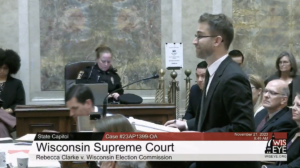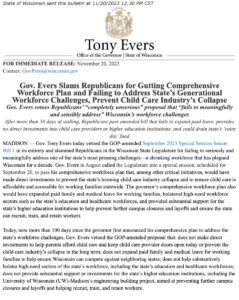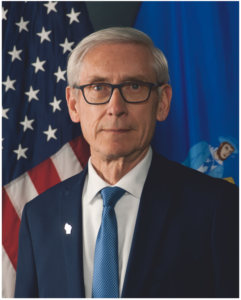
In this update:
- Supreme Court Updates
- Administration Updates
Supreme Court Updates
SCOWIS hears oral arguments on redistricting case

The Wisconsin State Supreme Court heard oral arguments on Tuesday on the redistricting case brought forward by left-leaning group Law Forward in August. The petitioners in the case argue that the legislative maps violate the rights of voters based on their political views and where they live. The petitioners asked the justices to declare the state’s current maps unconstitutional and order that new maps be redrawn under “traditional redistricting criteria” by mid-March 2024. The respondent Republican legislators argued that the petitioners already had proper time to bring forward their complaint during Johnson v. Wisconsin Elections Commission.
The petitioners focused their argument on four main points:
- That Wisconsin has several non-contiguous detached pieces or voting islands and districts that are not bounded by county, town, city, or ward lines.
- That legislative districts should be compact as a way to ensure that there is equal representation for the populations being represented.
- That the current legislative maps are illegal because they didn’t follow the constitutional process of being passed by the legislature and signed by the governor.
- That this could be remedied by allowing for submittal of entirely new maps and allowing the Court to choose the most neutral, legal option.
The respondents focused their arguments on six main points:
- That the petitioners do not have standing to bring this case forward because they were already given the opportunity to litigate this issue and waited to bring it forward until composition of the Court changed.
- That there is no need to redraw the maps for the entire state as a remedy to a singular petitioner living in a Beloit area “municipal island”.”
- That the current maps meet the 1848 definition of “contiguous,” which means “near close by” or “connected”.
- That if a “judicial remedy” is imposed, it should be limited to the districts of the harmed petitioners and should avoid an unnecessary statewide fix.
- That if the petitioners are granted their request for remedy that it should be required that all lawfully elected senators remain seated, that the legislature is give the opportunity to exercise its constitutional right to redistrict, and that both sides are given proper time to litigate this case.
- That there is value in having this matter litigated or placing “latches” on this matter to allow for Wisconsinites to move forward without more disruption.
Read the full memo outlining all arguments and the Justices lines of questioning: Clarke v. WEC Oral Arguments Memo.docx
Watch the full oral arguments here.
Administration Updates
Governor Tony Evers vetoes $2.2 billion GOP Tax Cut
 Governor Tony Evers (D) vetoed the $2.2 billion tax cut passed last week by the GOP Senate and Assembly. In his press release, Gov. Evers slammed Republicans for failing to seriously and meaningfully address the state’s shrinking workforce that “has plagued Wisconsin for a decade.” Senate Majority Leader Devin LeMahieu (R) responded to the governor, saying that he once again rejected tax cuts for Wisconsinites. “It is disappointing that Governor Evers continues to insist on leaving billions of dollars in Madison coffers rather than returning the surplus from where it came – taxpayers,” Sen. LeMahieu said.
Governor Tony Evers (D) vetoed the $2.2 billion tax cut passed last week by the GOP Senate and Assembly. In his press release, Gov. Evers slammed Republicans for failing to seriously and meaningfully address the state’s shrinking workforce that “has plagued Wisconsin for a decade.” Senate Majority Leader Devin LeMahieu (R) responded to the governor, saying that he once again rejected tax cuts for Wisconsinites. “It is disappointing that Governor Evers continues to insist on leaving billions of dollars in Madison coffers rather than returning the surplus from where it came – taxpayers,” Sen. LeMahieu said.
Wisconsin’s current budget is estimated to have a $4 billion surplus in mid-2025. Gov. Evers argues that the $2.2 billion package would compromise the state’s ability to provide spending increases to programs in 2025-27. He also claims the package could force the state into the $1.8 billion rainy day fund. “With each continued day of Republican delay and inaction, Wisconsin families, employers, and communities — especially in our rural areas — pay the price,” Gov. Evers said. “We need ongoing, sustainable state investments to stabilize our childcare industry, increased support for working families and our higher education institutions, and new efforts to recruit, retain, and train a workforce that meets the needs of the 21st Century.”
Senate Special Session Bill 1 was originally a $1.3 billion workforce development package proposed by Governor Tony Evers (D) that was subsequently amended and passed by Senate Republicans last month to include the tax reduction measures. The bill would reduce the individual income tax rate in the third highest bracket to 4.4% from 5.3%. The bill also includes a raise to the state income tax credit for those claiming the federal child and dependent care tax credit by increasing the employment-related expense limit. An increase to the deduction for having a child attend private school is also in the proposal. Gov. Ever’s workforce package was intended to address state subsidies for childcare providers and included paid family and medical leave program, more state aid for the Universities of Wisconsin, and other proposals.
Gov. Evers’ release can be seen here.
Gov. Evers calls on Joint Finance Committee to release $2 million in grants for two Wisconsin tribes
 Governor Tony Evers (D) requested the Joint Finance Committee (JFC) to release $2 million in grants for two Wisconsin tribes. The JFC did not approve the funds last month from the grants set aside in the budget. The budget allocated $11 million for Tribal Assistance Grants through tribal gaming revenue funding. Co-chair Rep. Mark Born (R) and co-chair Sen. Howard Marklein (R) withheld the funds set aside in the budget last month because they had “taken adverse actions against their fellow Wisconsinites.” The Republican committee members have never explained why they approved grants for nine tribes on October 31st but not the Bad River Band of Lake Superior Chippewa and the Lac du Flambeau Band of Lake Superior Chippewa. The state’s eleven federally recognized tribes were expected to receive $1 million each. The committee voted in favor 8-4 for the other nine tribes last month.
Governor Tony Evers (D) requested the Joint Finance Committee (JFC) to release $2 million in grants for two Wisconsin tribes. The JFC did not approve the funds last month from the grants set aside in the budget. The budget allocated $11 million for Tribal Assistance Grants through tribal gaming revenue funding. Co-chair Rep. Mark Born (R) and co-chair Sen. Howard Marklein (R) withheld the funds set aside in the budget last month because they had “taken adverse actions against their fellow Wisconsinites.” The Republican committee members have never explained why they approved grants for nine tribes on October 31st but not the Bad River Band of Lake Superior Chippewa and the Lac du Flambeau Band of Lake Superior Chippewa. The state’s eleven federally recognized tribes were expected to receive $1 million each. The committee voted in favor 8-4 for the other nine tribes last month.
Gov. Evers asked the Department of Administration to seek the release of the funds to both tribes. He criticized the committee saying, “This is just yet another in a long list of examples of Republicans’ ongoing efforts to obstruct basic functions of government.” Gov. Evers also asked the state Supreme Court to take original action in the suit the Department of Justice filed on Gov. Evers’ behalf regarding prior committee actions. “My request to Republicans is simple: stop playing politics with the Native Nations in this state and release these funds that are essential for Tribes to provide governmental services to their citizens and communities,” Evers said. Lac de Flambeau Tribal President John Johnson Sr. and Bad River Tribal Chairman Robert Blanchard recently sent the committee a letter urging legislators to release the funds.
The Lac du Flambeau and the town of Lac du Flambeau have been in a dispute over municipal roads that pass through the tribe’s reservation, and the tribe charges the town for access of the road. The federal appeals court ruled in 2022 that Wisconsin cannot force tribal landowners to pay property taxes on reservations, including property sold to someone not in the tribe and then later sold back to a tribal member. The Bad River reservation contains the entire town of Sanborn and has lost 85% of its taxable property. “While we respect their autonomy as a tribe, we must also respect the taxpayers who are suffering as a result of the tribes’ decisions,” Rep. Born and Sen. Marklein said in a joint statement. “They have prevented access to private properties, levied unreasonable fees on local municipalities, and are causing skyrocketing property taxes all due to their actions.”
Gov. Evers’ release can be seen here.



